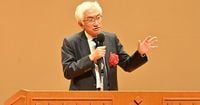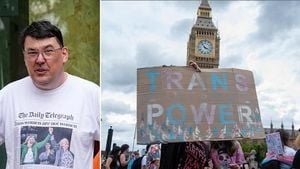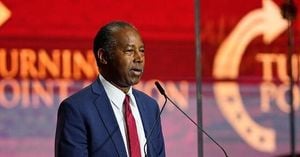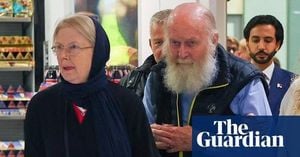On May 3, 2025, a symposium held in Naha City has sparked significant controversy, particularly concerning remarks made by Liberal Democratic Party (LDP) Upper House member Masashi Nishida about the exhibition at the Himeyuri Peace Museum in Itoman City. Nishida, addressing a gathering organized by the Shinto Political League, the Prefectural Shrine Agency, and the Japan Conference, described the museum's display as 'hideous' and accused it of 'rewriting history.'
The event, known as the "Constitution Symposium," attracted 208 attendees, where Nishida, along with House of Representatives member Sachiyuki Kokuba, discussed constitutional revisions. Nishida’s comments about the Himeyuri Peace Museum were particularly striking, as he recalled his visit to the site decades ago, prior to his political career. He expressed discontent with the way the museum portrayed the role of the Japanese military during World War II.
Nishida's criticisms did not stop at the museum's exhibition. He claimed that the current Japanese Constitution, promulgated on November 3, 1946, coinciding with Emperor Meiji's birthday, was a product of occupation policy. He argued that the contents of the Imperial Rescript on Education reflect the 'traditional spirit of the Japanese people' and lamented that history has been altered through the Tokyo Trials.
His remarks drew immediate backlash, particularly from the head of the Peace Memorial Museum, who expressed outrage at Nishida's statements, stating that they 'trample on the feelings of Okinawan war survivors.' This reaction highlights the sensitive nature of discussions surrounding World War II and its legacy in Japan, especially in Okinawa, where the battle was particularly devastating.
During the symposium, Kokuba also emphasized the need for constitutional changes, specifically pointing out the absence of an emergency clause in the current constitution. He referenced potential threats, including large-scale disasters and the situation regarding Taiwan, arguing for the importance of extending the terms of Diet members and enabling emergency ordinances to strengthen government powers during crises.
Nishida's comments have reignited discussions about how history is taught and remembered in Japan, especially regarding the Okinawa War experience. The Himeyuri Peace Museum, dedicated to the memory of students who died during the Battle of Okinawa, has often been a focal point of debate over the portrayal of wartime events.
In his speech, Nishida urged the need for legal preparations for national protection before emergencies arise, criticizing the direction of post-war education and calling for a reevaluation of historical narratives taught in schools. He stated, "Before an emergency occurs, we must ensure that we have laws in place to protect our citizens. This includes reassessing the flawed education we have had since the war. We must stop the misguided practices that have persisted over the decades."
This symposium and the ensuing comments from Nishida reflect ongoing tensions in Japan about national identity, historical memory, and the role of the military during wartime. The Himeyuri Peace Museum, which has been a site of remembrance for many Okinawans, stands at the center of this debate, as it seeks to honor the memories of those who suffered during the war while also facing criticism from political figures like Nishida.
As discussions about constitutional reform continue, the implications of historical narratives in shaping current political discourse remain significant. The remarks made by Nishida not only challenge the established narratives surrounding the war but also highlight the differing perspectives within Japanese society regarding how history should be remembered and taught.
The response from the Peace Memorial Museum's director underscores the emotional weight that such discussions carry, particularly for those who lived through the Okinawa campaign. The balance between honoring historical truths and navigating political agendas is a delicate one, and the reactions to Nishida's comments illustrate the complexities involved.
Looking ahead, the ongoing dialogue about constitutional reform and historical representation in Japan will likely continue to evolve, particularly as the nation grapples with its past while considering its future. The events of May 3 serve as a reminder of the power of history in shaping contemporary political landscapes and the importance of dialogue in addressing these sensitive issues.




